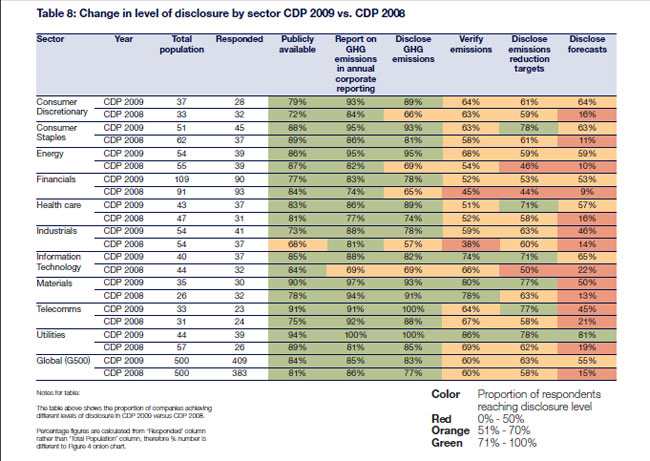A record number of companies submitted data to the Carbon Disclosure Project (CDP) survey in 2009, and the data showed substantial increases in the attention of corporate executives to Sustainability issues.
Those are some of the key findings of the just released 2009 Carbon Disclosure Project Report, available here: 2009 Carbon Disclosure Project Report. (See also Understanding the Carbon Disclosure Project.)
The CDP sent this year’s survey out to some 3700 of the largest businesses across the globe, using, in part, the smart tactic of having the CDP backed by 475 institutional investors with $55 trillion of funds under management, giving added reason for companies to respond and participate.
Among the global 500 companies, 409, or 82%, responded this year, up from 77% in 2008. US company participation was at 66%.
There was a substantial increase in the number of Asian companies responding as well, up by 39% (51 to 71) from CDP’s 2008 survey. Even stronger was the rate of response from the so-called BRIC countries (Brazil, Russia, India, China), which doubled over 2008 numbers to 44% (16 out of 36), including a 100% response rate from Brazilian companies that received the survey.
The survey asks for a lot of data, but key metrics include actual C02 emissions; reduction targets; forecasts; verifying emissions and annual reporting efforts.
The data showed increasing corporate attention to CO2 emissions, both globally and for US companies. For example, 52% of U.S. companies said they have targets for reducing emissions versus 32% in 2008. The goals are also being raised: 9% of respondents aim at reducing emissions 5% each year, compared with just 1% of respondents last year. This is likely fueled by a combination of public pressure, of which the CDP is one of several sources, a sense that this is increasingly an issue that consumers will be concerned with, and the prospects for potential legislation, such as the Waxman-Markey cap-and-trade bill that the US House passed in June. Such legislation would likely, ultimately, create financial incentives to reduce CO2 emissions.
The report uses its own methods of pressure by calling out the largest “non-responders” in each of several industries, seemingly design to create some “badge of shame” to firms that choose not to disclose. Similarly, there is a list of the highest performing companies on the CDP’s new total CO2 performance index.
Similarly, in a later section, the report provides quotes from un-named individuals, but named companies in various industry sectors by what might be termed “level of enlightenment” – in other words, a very supportive, aggressive type comment from one company in a sector, and a less enthusiastic response from another in the same industry.
There was some wide variation in the percent of respondents by industry sector but, more importantly, by different CO2-related practices, as shown in the graphic below.

For example, 59% of industrial companies say they verify emissions, versus 86% of utilities, likely stemming, in part, from the fact that the effort for utilities may be easier. The industrial number, however, is up sharply from just 38% in 2008.
The report says that “What is needed is a new model of business profitability; one that takes into account the full costs of doing business and incorporates a company’s long-term impact on the environment as well as on local communities.”
What’s your take on the Carbon Disclosure Project? Do you like or dislike its increasing focus on calling out companies that it deems leaders and laggards on this issue? Let us know your thoughts at the Feedback button below. 
TheGreenSupplyChain.com is now Twittering! Follow us at www.twitter.com/greenscm
|